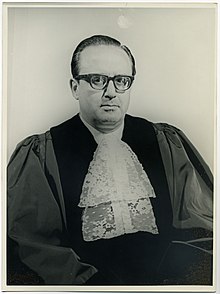José María Ruda
José María Ruda (born August 9, 1924 in Buenos Aires , † July 7, 1994 in s'Agaró , Spain ) was an Argentine lawyer and diplomat . From 1973 to 1991 he worked as a judge at the International Court of Justice in The Hague , including from 1988 to 1991 as President of the court.
Life
José María Ruda was born in Buenos Aires in 1924 and completed a law degree at the Universidad de Buenos Aires there by 1949 , where he was also professor of international law from 1960 to 1973. He also received an LL.M. degree from New York University in 1955 . From 1950 to 1955 he worked in the Department for the Codification of International Law of the Legal Affairs Division of the United Nations (UN). He then began a career in the diplomatic service in his home country and in 1961 became legal advisor to the Argentine Ministry of Foreign Affairs .
In the following years he represented Argentina regularly at the meetings of the UN General Assembly and in 1965 was appointed permanent representative of the country to the United Nations. He held this office for five years, during which Argentina was a non-permanent member of the UN Security Council for two years . From 1954 to 1972 he was a member of the International Law Commission , including in 1968 as its chairman. In 1970 he returned to his home country and became Undersecretary of State in the Ministry of Foreign Affairs. Three years later, in February 1973, he was elected Judge to the International Court of Justice (ICJ) in The Hague and at the age of 49 was one of the youngest judges ever elected in ICJ history. He was a member of the court until 1991 and served in the last three years of his tenure from 1988 to 1991 as its president and subsequently in one case as an ad hoc judge.
José María Ruda was considered independent in his views as well as his positions contained in the court decisions. During his time as President of the International Court of Justice, he succeeded comparatively often in obtaining a unanimous decision from the court. Immediately after his work at the IGH, he was President of the Iran-United States Claims Tribunal until 1993 . In the following years he worked in the interstate as well as in the economic field as a consultant and mediator in international disputes. He died in 1994 of a heart attack while on vacation on the Costa Brava .
Works (selection)
- Instrumentos internacionales. Tipográfica Editora Argentina, Buenos Aires 1976
- Presente y futuro del Tribunal Internacional de Justicia. Universidad de Granada, Granada 1990
- Derecho internacional publico. Tipográfica Editora Argentina, Buenos Aires 1994
literature
- Stephen M. Schwebel : Jose Maria Ruda (1924-1994). In: American Journal of International Law . 89 (1 )/1995. American Society of International Law , pp. 90-92, ISSN 0002-9300
- José María Ruda. In: Arthur Eyffinger, Arthur Witteveen, Mohammed Bedjaoui : La Cour internationale de Justice 1946–1996. Martinus Nijhoff Publishers, The Hague and London 1999, ISBN 9-04-110468-2 , p. 322
| personal data | |
|---|---|
| SURNAME | Ruda, José María |
| BRIEF DESCRIPTION | Argentine lawyer, President of the International Court of Justice (1988–1991) |
| DATE OF BIRTH | August 9, 1924 |
| PLACE OF BIRTH | Buenos Aires |
| DATE OF DEATH | July 7, 1994 |
| Place of death | s'Agaró , Spain |
